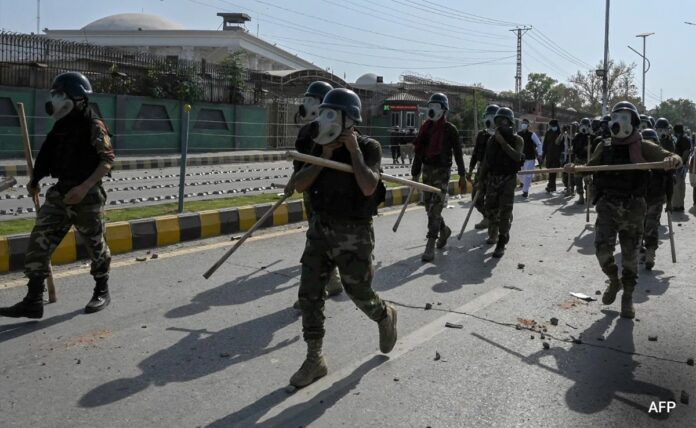| Translate This News In |
|---|
Late on Wednesday, as Imran Khan was dramatic detained and later held in custody for eight days on new corruption accusations, Pakistan’s political unrest worsened, with violent national rallies growing and the government mobilising the military.
Khan was detained on Tuesday at an ordinary hearing in the capital Islamabad and taken to an undisclosed location overnight before making an appearance behind closed doors in a specially convened anti-graft court at police headquarters.
Following months of political unrest during which Khan, who was dismissed in April of last year, launched an unprecedented campaign against the nation’s formidable military, the upheaval—which included large arrests of protesters—has taken place .
According to a statement from the office of Prime Minister Shehbaz Sharif, the cabinet approved the army’s deployment in two provinces and the capital on Wednesday in order to restore peace.
Security personnel used tear gas to disperse Khan’s Pakistan Tehreek-e-Insaf party supporters in Karachi, Pakistan’s largest metropolis, while in Islamabad and other cities, PTI supporters violently fought with police.
A lawyer representing Khan named Ali Bukhari told AFP over the phone that the court had agreed to Khan’s physical detention for eight days as requested by the nation’s top anti-corruption agency.
Another one of Khan’s attorneys, Afzal Marwat, had earlier said that although Khan was in “good spirits,” the paramilitary personnel who detained him had struck him on the head and knee.
The former cricketing icon, who is still incredibly well-liked, has argued in the past that the numerous legal proceedings against him are an attempt by the weak government and military establishment to keep him from regaining power.
Numerous cities have seen thousands of his fans go to the streets in response to his arrest.
According to police and medics, at least six individuals have passed away in connection with protest-related incidents, including one who passed away from smoke inhalation after a Lahore building was set on fire.
encounter with the military
Western governments quickly reacted, supporting peaceful democracy in the wake of the arrest and the ensuing bloodshed. On Wednesday, the UN urged authorities to “respect due process” and the law while dealing with Khan.
Khan was apprehended a few hours after the military reprimanded him for saying a senior commander was involved in a murder plot against him.
Since the nation’s inception in 1947, Pakistani politicians have regularly been detained and imprisoned, but few have confronted the military so forcefully, despite the fact that it has conducted at least three coups and ruled for more than three decades.
In Pakistan, where army chiefs have a big say in both internal and foreign affairs, it’s uncommon to hear criticism of the military establishment.
The message being sent by this arrest is probably that all restraints have been lifted.
Close associates of Khan expressed worry that he would endure torture while detained.
Zulfikar Bukhari, his former special assistant and a member of the PTI, told Sky News that “none of us has had any access” to Khan. “We’re terrified that he’ll be tortured,”
Internet outage and postponed tests
According to the nation’s communications agency, the interior ministry has ordered the termination of mobile internet services and a restriction on access to Twitter, Facebook, and YouTube.
Authorities have issued closure orders for all schools worldwide, and pupils will not be taking any final examinations.
Numerous police personnel have suffered injuries, and about 1,000 people have been detained in Punjab, which has a large population.
The corps commander’s mansion in Lahore was set on fire by some protesters, while the army’s general headquarters in Rawalpindi was attacked with rocks.
A “strong reaction” would be taken against individuals who target military and government installations, the military’s media wing said on Wednesday.
According to Law Minister Azam Nazeer Tarar, there was “no political vendetta” behind Khan’s detention.
His incarceration was caused by a complaint that was filed by Pakistan’s leading anti-corruption agency, the National Accountability Bureau, who claimed that he had disregarded numerous court summonses.
With Khan pushing for early elections and the government struggling under the weight of economic and security uncertainty, Pakistan is deeply entangled in a political and economic crisis.
In an effort to avoid being arrested, he has become more and more outspoken about the status quo and relies on the fervent backing of the large crowds that attend his public appearances.


















